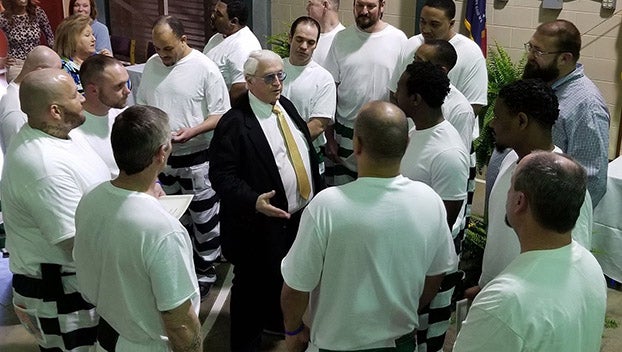Mississippi prisons may soon exceed capacity
Published 10:04 am Thursday, December 8, 2022

- Mississippi Corrections Commissioner Burl Cain talks to inmates following the first graduation on April 1, 2022, of the new comprehensive Betty Ford-type alcohol and drug treatment program at the Walnut Grove Correctional Facility in Leake County. (Photo courtesy of MDOC)
By Jerry Mitchell
Mississippi Center For Investigative Reporting
Mississippi — the world’s leader in imprisoning people — will soon skyrocket past its capacity to hold them all.
In just 10 months, the state’s prison population has exploded, rising almost twice as fast as inflation. If this rate persists, the Mississippi Department of Corrections would exceed its listed capacity of 20,443 over the next several months.
Eldon Vail, an inspector of Mississippi prisons in recent years, called the alarming rate “pouring gasoline on a top of a fire that is already raging.”
Between 1993 and 2013, the state’s prison population more than quadrupled, thanks largely to mandatory minimum sentences, with the population peaking in the past decade at more than 23,000. That prompted a push for reforms that included House Bill 585, which then Republican Gov. Phil Bryant signed into law in 2014.
In the years since, reforms and an aggressive Parole Board reduced the number of inmates. By 2016, Mississippi had fallen into third place in per capita imprisonment, trailing Louisiana and Oklahoma.
Five years later, additional reform took place with the passage of the Mississippi Earned Parole Eligibility Act, which gave thousands more inmates the opportunity to go before the Parole Board. By Feb. 7, the prison population had fallen to 16,499, the lowest level in two decades.
That fall mirrored the nation, which saw the prison population decline more than 16% in all states but one between 2019 and 2021, according to the Vera Institute of Justice. (The lone holdout? Alaska, which rose 3.6%.)
But under the leadership of new Parole Board Chairman Jeffrey Belk, that trend has reversed itself.
Ten months later, Mississippi’s prison population now exceeds 19,000 in what the Corrections and Criminal Justice Oversight Task Force calls “unprecedented growth.” If this growth continues at the same rate through 2023, that population would surpass 22,500 for the first time since 2010.
Mississippi Corrections and Criminal Oversight Task Force
If Mississippi hits that number, taxpayers would be forced to pay $111 million more a year than they were paying in 2020 before the population hike, based on the per-day cost figured by the state’s legislative watchdog, Performance Evaluation and Expenditure Review. That’s more than enough to fund the state Department of Health, the governor’s office and a dozen other state agencies.
“While other states are reducing their prison populations, Mississippi is backsliding, thanks in large part to the actions of the Parole Board,” said Cliff Johnson, director of the MacArthur Justice Center at the University of Mississippi School of Law. “It’s demoralizing. It’s infuriating. And it’s terrible corrections policy.”
The population increase has come, despite the decline in Mississippians sentenced to prison, going from 4,270 in 2018 to 3,189 over the past year, according to the task force’s report.
In an interview, Belk told MCIR that the Parole Board is “not a numbers-driven board.”
Some people want the board to “just blindly parole people and not care if they come back,” he said. “We’re not going to do that.”
For his part, Corrections Commissioner Burl Cain said he isn’t worried about MDOC surpassing capacity, because his agency is creating 660 new spaces inside Mississippi prisons. That includes a move of all female inmates from Central Mississippi Correctional Facility in Pearl to the Delta Correctional Facility in Greenwood.
To curb the rise in prison population, he’s banking on better drug rehabilitation and job training programs to reduce recidivism.
About three-fourths of those behind bars in Mississippi battle drug or alcohol problems or both. Cain said a robust rehabilitation program is now available to 2,700 different inmates.
Mississippi Corrections and Criminal Oversight Task Force
While serving as superintendent of the Louisiana Penitentiary at Angola, he established a job training program that resulted in a three-year recidivism rate of 9.4% for those who finished the program compared with 34% for the average inmate, according to the Louisiana Commission on Law Enforcement.
He hopes to replicate that success in Mississippi, where the three-year recidivism rate is about 33% and the five-year rate is 77%, according to the 2022 World Population Review.
So far, “we have about 170 inmates in the program,” with more to come, he said.
Most of the instructors, who are inmates, earn 25 to 30 cents an hour, or about $52 a month, he said. “It gives them a little bit of independence, and it’s really good for morale.”
MDOC’s work release program plays a companion role in this. “We have 23 out of 25 inmates in jobs making $15 an hour,” he said. “They’re not going to come back.”
Senior U.S. District Judge Keith Starrett of Hattiesburg, who chairs Mississippi’s Reentry Council, praised Cain for providing job training, moral training and job certification. “Reducing recidivism saves lives, money, families and communities,” he said.
House Bill 585 sought to reduce prison overcrowding, which the Pew Foundation estimated would save Mississippi $266 million over a decade.
But the lawmakers’ promise to use those savings for corrections programming never took place, Starrett said. “The Legislature looks out for a lot of folks, but prisons and programs that reduce recidivism are way down on their list of priorities.”
The weak link is the follow-up in programming for those leaving prison, he said. “Let’s say somebody is successful in getting drug treatment, getting a GED and getting a job, but the first week on the job, they cuss at their boss and get fired.”
Now the work goes away, “and they get discouraged and start stealing or selling drugs,” he said. “You’ve got to have support, supervision and encouragement.”
The ultimate goal of both law enforcement and corrections is community safety, and the way to make the community safer is to reduce recidivism, he said. “Of those in prison, 98% are coming back into the community. What’s important is what kind of people they are when they come back. You don’t want them coming home and breaking in your mama’s house.”
Hinds County District Attorney Jody Owens II — who worked with the then-governor and lawmakers of both parties to help pass House Bill 585 — questioned the rise in inmates. “Are we safer because we are incarcerating more people?” he asked.
Former Chairman Steve Pickett said his Parole Board had a parole rate of about 60%. That is, six out of 10 inmates eligible for parole were able to go free. Belk puts his board’s rate at about 40%.
In contrast to the past board, the current one regularly sets off parole hearings for inmates for years, sometimes as much as seven years before they’re eligible again.
Evelyn Smith, 80, who has served 31 years in prison, was denied parole. The Parole Board chairman said she was “unparole-able.” MDOC
Belk cited the case of 80-year-old woman Evelun Smith, who has been in prison 31 years. He said she had come up for a parole hearing every six months. This time, the Parole Board set her off five years.
“She was not ‘parole-able,’” Belk said. “She didn’t know the heinousness of her crime.”
In 1991, Smith and her boyfriend, Phillip Beard, were given life sentences for their roles in stabbing to death a 28-year-old woman, Dedra McGill of Brookhaven, who had “snitched” on Beard, according to the McComb Enterprise-Journal. Smith testified that Beard had been plotting to kill McGill before she spoke to a grand jury investigating Beard’s drug dealings.
Smith is also serving a 20-year sentence for armed robbery for the couple using McGill’s car to drive them to Louisiana to dump McGill’s mutilated and burned body.
In addition to the current board granting fewer paroles, Mississippi judges are giving longer sentences, according to the task force report. The average sentence in 2018 was 7.7 years; now it’s 8.9 years. The number of those imprisoned for drug offenses has risen from 38.8% in 2018 to 47.3% over the past six months.
State Public Defender André de Gruy said he doesn’t think anyone, including the Parole Board, “knows what they are doing regarding case plans or presumptive parole. They have never followed 585 on presumptive parole.”
The state’s presumptive parole law allows MDOC to release inmates without a parole hearing if they satisfy their case plans.
“Under this program, we tell people exactly what is expected of them when they enter prison, and we reward them when they meet those expectations,” Johnson said. “Our Republican-led Legislature wisely passed the law almost a decade ago, and it has never worked like it is supposed to.”
In a 2021 report, PEER, the state lawmakers’ watchdog, concluded that the Parole Board conducted 274 unnecessary hearings for offenders who qualified for this presumptive parole.
Belk said that was PEER’s “nice way of saying they [the Parole Board and MDOC] weren’t doing it.”
He and Cain are now working to make presumptive parole a reality. That will start with creating a case plan, which will capture education levels, job skills and needs, such as alcohol or drug addictions, when an inmate enters prison, Belk said.
That plan will detail programs for the inmate to take part in, such as getting a GED, developing job skills or taking part in a recovery program, he said. If inmates complete those plans, “there’s no reason why the majority of those can’t be paroled,” he said.
If an inmate rejects chances to improve, it’s better for that inmate to wait, Belk said. “Call it tough love. Sometimes the best thing to do is not parole.”
In fact, he said, some inmates have asked the board to revoke their parole so that they could get six months of intensive drug and alcohol treatment at Walnut Grove Correctional Facility.
Ashley Lukens, president of Mississippi Dreams Prisoner Advocacy, said one major problem is inmates often can’t take classes and programs because of shortages in both correctional officers and case managers.
Since Belk took over as chairman, the Parole Board has increased the number of parole revocations from 1,949 in 2018 to an estimated 2,496 for 2022; the percentage of time served by inmates has risen from 53.5% in 2021 to 60.1% in the last quarter.
To stem this tide, de Gruy suggested the board and judges better utilize Technical Violation Centers. “A lot of people are going to prison for failure to pay fines, fees and assessments. It’s unconstitutional to send someone to prison who can’t pay.”
There needs to be reinvestment, including housing, transportation to jobs for those paroled and improvements in mental health, he said. “We need to relieve the financial burdens because 80% of people entering at arrest can’t afford a lawyer. We then add more and more financial burdens at every step of the process.”
Beyond these issues, there is the question of how many more inmates the Mississippi Department of Corrections can handle.
At the State Penitentiary at Parchman, the department has had to add bunks in order to have enough beds for inmates to sleep. Inmates in Unit 30 told MCIR they now have 104 people, but only three showers, six urinals, five toilets and five sinks.
All this is happening at the same time the department is struggling to hire and retain correctional officers, despite pay raises in recent years. MDOC officials say one of the biggest problems has been retention.
In 2014, the department had 1,591 correctional officers, according to the state Personnel Board. Today, that number is less than 1,000, even though the state is now operating two additional prisons: Walnut Grove Correctional Facility and Marshall County Correctional Facility.
Pickett, who chaired the Parole Board between 2013 and 2021, called the current correctional officer-to-inmate ratio “dangerously low.” So are the case manager numbers, he said.
“We have to accept our failure to invest in good criminal justice public policy,” he said. “We can’t keep pushing the failures back onto local police and county jails and expecting a different outcome.”
Cain said he hopes to solve this shortage through a pay raise for starting correctional officers, beginning Jan. 1. It’s a raise the Personnel Board has already approved.
Will the new pay raise succeed where the old ones failed? For years, starting officers earned $24,900 before the pay rose to $27,149. After Cain arrived in 2020, he convinced lawmakers to boost the starting salary, which is now $36,720. Despite that, MDOC continues to struggle with retaining workers. Cain hopes the newest raise to $40,248 does the trick.
Vail said in recent years, he has witnessed staffing levels so low inside Parchman and East Mississippi Correctional Facility that there wasn’t even a single officer to watch units holding prisoners of 100 or more.
“When that is the case, the vacuum of power and control is ceded to the prisoner population in the form of gangs,” said Vail, who served as corrections secretary for the state of Washington.
In an April report, Justice Department officials criticized “gross understaffing” at Parchman and “uncontrolled gang activity,” which leads to “an environment rife with weapons, drugs, gang violence and extortion. … MDOC officials have long known about these unsafe prison conditions, but have continually failed to correct the conditions.”
In recent months, Parchman has seen a new wave of violence.
On Sept. 26, inmate Richard Weems, who was serving 25 years for armed robbery and 25 years for kidnapping out of Madison County, was killed by blunt force trauma to his head.
Two weeks later, inmate Markeith Williams, who was serving a 25-year sentence for armed robbery out of Grenada County, was stabbed to death in Parchman’s Unit 29, which has a long history of violence, including the killings of three inmates in a 2019-2020 riot.
Despite having the highest incarceration rate in the nation, Mississippi spends less per inmate than any other state.
“Lack of adequate funding is the primary reason for the extraordinary levels of violence and death in the Mississippi Department of Corrections,” Vail said.
Whatever momentum there might have been to parole more people from prison may have been undone by the case of Frederick Bell, whom the Parole Board voted to release under supervision after he served 31 years behind bars for the 1991 killing of a 21-year-old clerk during a store robbery. He also pleaded guilty to killing a 20-year-old man in Memphis.
Bell committed the crimes when he was 19, and now he serves as a mentor, teacher and pastor behind bars.
In August, the Parole Board concluded that he had been rehabilitated and voted to free him, but when criticism followed, the board reversed its decision — just hours before he was slated to walk out the doors of Parchman prison.
Brandon Jones, director of political campaigns for the Southern Poverty Law Center, criticized Mississippi’s “terrible thicket of sentencing laws,” which include “one of the most unforgiving habitual offender arrangements in the world.”
This means thousands of Mississippians held behind bars have “no path to parole at all,” he said. “There needs to be more reasonable paths to parole and a Parole Board that sees the value in second chances.”
This story was produced by the Mississippi Center for Investigative Reporting, a nonprofit news organization that is exposing wrongdoing, educating and empowering Mississippians, and raising up the next generation of investigative reporters. Sign up for our newsletter.
Email Jerry.Mitchell@MississippiCIR.org. You can follow him on Facebook, Twitter or Instagram.
This story was also produced in partnership with the Community Foundation for Mississippi’s local news collaborative, which is independently funded in part by Microsoft Corp. The collaborative includes MCIR, the Clarion Ledger, the Jackson Advocate, Jackson State University, Mississippi Public Broadcasting and Mississippi Today.





